Device and method for flame stabilization in a burner
a technology of flame stabilization and burner, which is applied in the direction of catalytic material combustion, combustion types, furnaces, etc., can solve the problems of inability to form spatially stationary flames, inability to use generic premix burners, etc., to achieve the effect of increasing design flexibility in construction and increasing nitrogen oxide emission
- Summary
- Abstract
- Description
- Claims
- Application Information
AI Technical Summary
Benefits of technology
Problems solved by technology
Method used
Image
Examples
Embodiment Construction
[0026]The schematized view represented in FIG. 1 shows a catalyst arrangement 1 embodying principles of the present invention which includes a flow passage 2 through which passes an air flow L from left to right in the drawing. Provided inside the catalyst arrangement centrally upstream of the flow passage 2 is a first catalyst 3, the so-called POX-catalyst, which has a plurality of catalyst passages orientated in the flow direction and which are lined on the inner wall with suitably selected catalyst material and is specially selected for the catalysis of a rich air / pilot fuel mixture. The POX-catalyst 3 on the upstream side is fed by an air / pilot fuel mixture 4, which consists of a completely mixed fuel flow mPOX,fuel and an air flow mPOX,air. The air / pilot fuel mixture 4 entering the POX-catalyst 3 is provided with an adjustable mixture ratio λPOX as well as a specifically adjustable mixture inlet temperature TPOX,in. Because, as already mentioned, the flow passages of the POX-ca...
PUM
 Login to View More
Login to View More Abstract
Description
Claims
Application Information
 Login to View More
Login to View More - R&D
- Intellectual Property
- Life Sciences
- Materials
- Tech Scout
- Unparalleled Data Quality
- Higher Quality Content
- 60% Fewer Hallucinations
Browse by: Latest US Patents, China's latest patents, Technical Efficacy Thesaurus, Application Domain, Technology Topic, Popular Technical Reports.
© 2025 PatSnap. All rights reserved.Legal|Privacy policy|Modern Slavery Act Transparency Statement|Sitemap|About US| Contact US: help@patsnap.com



